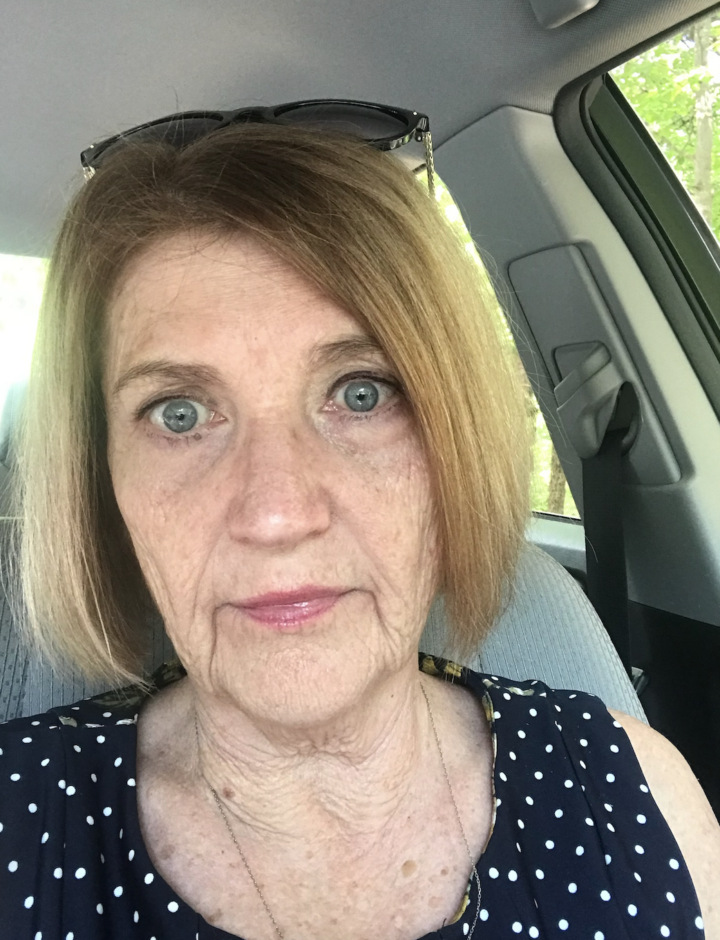Mickey Poandl, 32, says the appeal of living downtown comes from its busy atmosphere.
“I moved to Asheville from Washington, D.C., and I kind of missed the more urban, walkable lifestyle,” says Poandl, a public relations manager for Explore Asheville. “I went downtown a lot for the Black Lives Matters campaigns [in 2020], and I really liked the feeling of being with people and being a part of something. I thought that living downtown would be the perfect way to get more involved.”

Since 2020, Poandl has lived in a studio apartment in the Asheville Hotel Apartments, just above Malaprop’s Bookstore/Cafe. While Poandl admits the space is smaller than he would prefer, he says it meets his needs.
“I definitely don’t live in a luxury building or anything like that. For example, there’s no washer or dryer, but I am definitely willing to take all that for the sake of affordability,” says Poandl. “I pay a little over $1,000 a month, and while my rent has increased a bit, I don’t personally feel super financially crushed living here.”
In recent years, local and national reports have depicted downtown Asheville as a crime-ridden area. But in speaking with Poandl, his main concerns are walkability and transportation. As someone without a car, Poandl says downtown could use improvements to increase pedestrian accessibility.
“I think the core of downtown is very walkable, but some streets could use wider sidewalks, especially around Lexington [Ave.] and Walnut [St.],” says Poandl. “I think the bigger issue, however, comes from right outside of the downtown core. For example, when I am walking to Harris Teeter or Trader Joe’s on Merrimon for groceries, the pedestrian-friendly nature takes a sharp decline.”
Additionally, Poandl says public transportation should be improved.
“Right now, the bus route goes all the way down Merrimon before it turns around, making an hour commute out of something that would normally be 10 minutes by car,” says Poandl. “I don’t even use the bus because of that; I would rather just walk or call an Uber.”
But for others who live downtown, the issues are more severe: rising rents and frequent car break-ins are among the realities that are pushing some to reconsider which part of town they call home.
Rising rents
While the vibrant community and entertainment drew Poandl downtown, rising rent and a lack of affordable housing has forced 24-year-old Jasen Folds to look for other options.
“Don’t get me wrong, I absolutely love living downtown,” says Folds, a resident of The Patton apartments. “When I moved here, my rent was steep, but I could afford it. Now, it’s nearly double what I paid when I first moved, and I am at a point where about 70% of my paycheck each month goes to cover my rent. That is just not possible to keep up.”
Folds has lived downtown for two years. A resident of Asheville most of his life, he chose to live downtown to be close to his previous job.

“At the time, I was living with my parents and working as a bartender at Jack of the Wood,” says Folds. “I wanted to get out from under my parents, but I did not have my own car, so living downtown where I could walk to work seemed like the best option.”
While Folds has since purchased a car and found a different job outside downtown, he says he still appreciates being near the city’s nightlife.
“I don’t do it as often as I used to, but I really like being able to go out to different bars and just meeting new people,” says Folds. “When you live nearby, there is less of a worry about getting home at a decent time. I am going to miss that aspect of living [downtown] a lot.”
Folds believes the city is taking the right steps to address affordable housing downtown but wishes that there were fewer luxury condominiums and more apartments.
“I think the city is trying its best to address housing downtown, and I really like some of the projects that they are working on,” Folds says. “While it may be too late for them to do anything now, I think that downtown has way too many condos. They are great for people who can afford them, but for most of the people working downtown, they are way too expensive.”
Culture at the doorstep
For others, such as Anne Centers, the price of living downtown is far more affordable. Centers lives in the Battery Park Senior Apartments, subsidized housing for low-income seniors. She moved downtown from North Asheville nearly six years ago and says the accessibility of entertainment is one the biggest factors that has kept her there.
“I really like living downtown because you can walk anywhere and do pretty much anything,” says Centers. “I can go to restaurants, the movies, shopping, or just about anything else I would want to do. I also live close to the [Asheville Symphony Orchestra], so I used to go to that all the time. Everything is just so easy.”
Centers also says she feels safe downtown, despite hearing stories and complaints from others who live in the area.

“I have never felt unsafe downtown, even when I have walked late at night. I’ve heard stories of people being mugged or assaulted downtown, but I’ve never seen any of that,” says Centers. “The only real incident that I had was when I left my car unlocked and someone went through my glovebox, but that is something you have to deal with anywhere.”
For Centers, the biggest drawback from living downtown is a lack of parking. While she pays for parking near her apartment, she says it is often unregulated and will fill up with nonresidents and tourists during peak hours.
“My lot is supposed to be only for people who pay a fee, but a lot of tourists still park there during the day,” Centers says. “When it’s full, I have to park next to the library, which is a bit of a walk for me. When the weather is bad or I have a lot of groceries, not being able to park close by can be an issue. I hope in the future that the lots will be a bit more supervised.”
Additionally, Centers wishes downtown had more green spaces.
“As someone who loves being out in nature, I will say that downtown hardly has any good green spaces or parks,” says Centers. “A lot of people say that if a new park is developed, it will just become a place for homeless people, but I don’t understand why that would be a problem. They need somewhere to go during the day.”
Concerns with safety

Meanwhile, Jennifer McLaren, 43, says the number of homeless people and a series of break-ins has her questioning whether she made the right decision when she moved downtown less than a year ago.
“When my husband and I were looking for a new place, we saw the complaints that downtown had gotten more unsafe. At the time, we didn’t really believe that it was that serious because we both went downtown frequently without any issue,” says McLaren. “Since we have lived here, though, we’ve had a number of safety issues. It has definitely made our transition more difficult.”
McLaren says since she and her husband, James, who works downtown, moved from Hendersonville into a condo on Asheland Avenue last April, they have had their car broken into twice and she has been harassed on multiple occasions.
“I have had homeless people follow me to the entrance of my building, they have catcalled me from across the street, and one even tried to take my purse,” says McLaren. “While I have not had a negative interaction with the police so far, I wish that there were more on patrol because it sometimes takes them a while to respond.”
McLaren says she doesn’t regret her decision to move but wishes the city took a more active role in addressing the issue of crime.
“Overall, I do like living downtown. I love being able to walk everywhere, I love the restaurant and shopping scene, and I really love being close to events and concerts that are downtown,” says McLaren. “Even so, the safety issues that we have had have been really scary, and I wish the city would do something to increase police presence.”
Changing skyline
Several projects underway will bring hundreds of more residents downtown, many of them among the workforce.
“I think that downtown is growing, and it has a lot of potential, particularly on the western end near South French Broad Street and Carter Street,” says Poandl. “I really like when I see new apartments going up, and I think if we really want to make downtown a livable place, then there should be more affordable housing for people who work downtown as well as places to get groceries and clothes; the normal things that normal middle-class residents could use.”
Two developments Poandl is particularly excited about are microhousing apartments, including an 80-unit development at 217 Hilliard Ave. and a 231-unit development at 46 Aston St. According to David Moritz, developer of both projects, the Hilliard apartments will be completed by 2025 and the apartments on Aston by early 2026.
Poandl says he believes these units, if priced right, will be very appealing for downtown workers.
“I am really excited for the new microhousing developments that are coming,” says Poandl. “I think for a large majority of the people who work downtown, those apartments are going to be fantastic. I hope that we see more of these unique ways to address housing in the future.”
And to address safety concerns, the Buncombe County Board of Commissioners recently approved funding to add more Sheriff’s Office deputies downtown on weekend nights.
“I am glad to hear that the Sheriff’s Office is going to help, and I hope that it is going to help reduce crime,” says McLaren. “It is good to see the city and the county working together to address this, I just hope that it is a long-term plan and not something that they stop in three months.”




Onn the downtown safety issue front, it needs to be made clear that the Buncombe County Sheriff patrolling (with paid overtime) on weekend nights for a few hours is “political window dressing” by the Buncombe County Commissioners you elect.
Last October (2023), I presented a well researched formal study and request for Asheville to be refunded over $ 6 Million/year for taxes which Asheville residents pay to the county but for which we receive NO services. Most of this is the part of the Sheriff’s budget that funds county patrolling but also includes the County Fire Marshall.
Don’t be confused: The Buncombe County Sheriff has 2 budgets. One is for the operation of the County Jail; something that everyone in the county should pay for, including we in Asheville. The other budget is for law enforcement throughout the county but with a large portion of that effort being IN THE COUNTY ONLY.
Asheville has it’s own police force which, as Asheville residents, you and I have to pay for also. So basically, Asheville taxpayers are supporting TWO law enforcement functions (city and county). Does that seem equitable to you?
This $ 6 million/year that is due back to Asheville residents would FIX the underfunding of APD and allow for a well compensated and professional staff.
Keep in mind also that per the State Bureau of Inspection annual summaries of crime throughout our state, Asheville’s crime numbers are almost 4 to 1 greater (in almost every crime category) as compared to Buncombe County; this in spite a much smaller population and land area for Asheville.
But that is the reality of all our cities. Citites are where crime manifests the greatest. That is why we need this tax money back to properly support APD.
Asheville is hardly a city. They can barely keep the water on.
Police threw a temper tantrum and quit when we started protesting their tendency to harass, abuse, injure, or kill black and brown people and the homeless. I say good riddance. We need civil servants who serve us all, not just the residents who look like them.
If people think living in downtown Asheville is an urban setting, well, they really haven’t lived in an actual city or urban area. The pretense is silly.
Silly pretense? Please spare us the condescension. No, Asheville is not London. No one suggests that it is (or that anyone wants it too be). But the experience of rural vs urban living is relative, and defined by geography and context, as well as by the census bureau. As someone who lived most of my life in cities ranging in population from 2 to 8 million, but who has been a resident of downtown Asheville for many years – I will say that I know of no other place that has so much of what is core to the urban experience, packed into such a small space. Yet, it also comes with the benefit of being able to transport oneself to a totally different, mostly unpopulated, and very beautiful natural environment, in about 10 minutes.
But to the point at hand — Asheville is the largest city in the region. It is the core of the Asheville MSA, which encompasses all of Buncombe, Haywood, Henderson & Madison counties. It has a $17 billion economy, and a population of more than 413,000 – placing it 131 on the list of 387 largest MSAs in the country. This, of course, is also completely ignoring the 11 million visitors to Asheville each year, who on any given day can easily double the number of people here. And since use of the word “urban” seems to be the sticking point here, its usage is entirely appropriate given that if we get technical, the U.S. government defines urban as any jurisdiction with a population of 5,000 or more. Finally, being the population and economic hub of the region gives downtown Asheville an outsized role and importance which transcends it’s population and density. Perhaps the distorted perception at work here is the one coming from someone who uses a megalopolis as the measure of urban life, when in fact that is the outlier experience for most of the population of the U.S.
Justify it to yourself however you choose, but Asheville isn’t urban.
I suggest following your own advice to, “think a little,” and then respond. I made a case and provided support for why it absolutely is “urban” — both in terms of how government defines such areas, as well as with regard to Asheville’s population, and its role socially, politically and economically. You, on the other hand have offered nothing beyond an assertion for which you provide no support.
No point in pretending to have discussion with you regarding the pretense of a small mountain town being considered urban. You will simply use mindless regurgitated statistics to try and support a “definition” of urban. My suggestion is that you simply use your eyes and knowledge of the rest of the US and the world. Just because there is traffic and poorly designed thoroughfares or a density rating, it truly isn’t urban….no matter how much tpurist revenue it generates, breweries per capita, or failing healthcare system it tries to support. Asheville is the largest and most prosperous of the mountain towns in Western NC, but only people who wish and skew believe it is truly an urban wonderland. Stop being trapped in defending a ridiculous position. Accept what Asheville is an consider pointing out why a simple compilation of meaningless statistics including walkability doesn’t prove or disprove anything and wonder what the author believes pushing out an urban narrative accomplishes?
Define “urban.”
I believe that “Think a Little” believes that in order to be urban you need a subway system and not be able to see trees when you come back to the earth’s surface.
Anybody who thinks they want to move into the 200 sq ft studio/no kitchen “apartmnt” at 46 aston for > $1000 is nuts. It is a scam created by the developers who swore to the public at their required meeting that they would not request public money. they lied. If they open in 2026 they will close by 2027 and the city will pick it up for transient housing which has ben the plan all along.
Over 300 micro-housing apartments in downtown, with NO off street parking, attempts to solve a housing problem while exacerbating the existing downtown parking problem.
such housing is aimed at those WITHOUT cars !